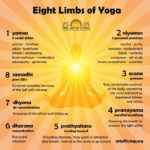Paras note: I’ve only collected the shlokas that I thought were useful and catagorised them e.g. repeating themes, duties, emotions, practices to be performed, etc. Either I found it to be of useful knowledge as in mindset (which will be of normal formatting) or they are instructions on how practices should be performed (which will be differentiated by bold or italics formatting). If you feel like I’ve missed something, please let me know as there are a few versions of the Gita that I cross referenced from and make sure I understand the shloka myself. I skipped chapters 9 and 10 because it is all about the opulence, omnipresence, omniscience and omnipotence of Lord Krishna and how you should see, offer, live in nothing but Krishna.
This posts is divided into
- Important pictures from the Gita
- Chapters and Number of Shlokas
- Repeating Themes
- Categorised Shlokas
- A summary from ChatGPT
Important Pictures from the Gita
I’ve included some pictures that are very important to me. I hated reading but loved looking at these pictures all the time and would search them out every time I came across the Gita. I personally feel I gained a lot just by looking at them and getting a deeper understanding of what they mean.
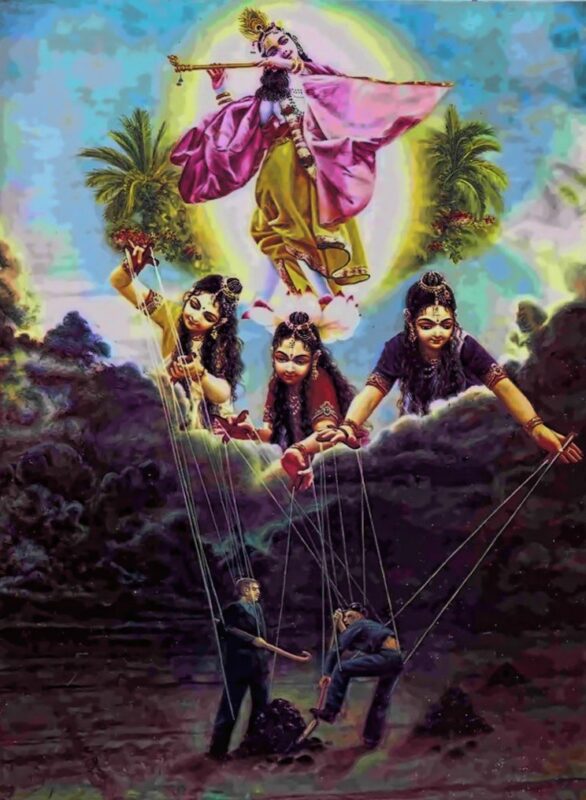
Amazon #ads

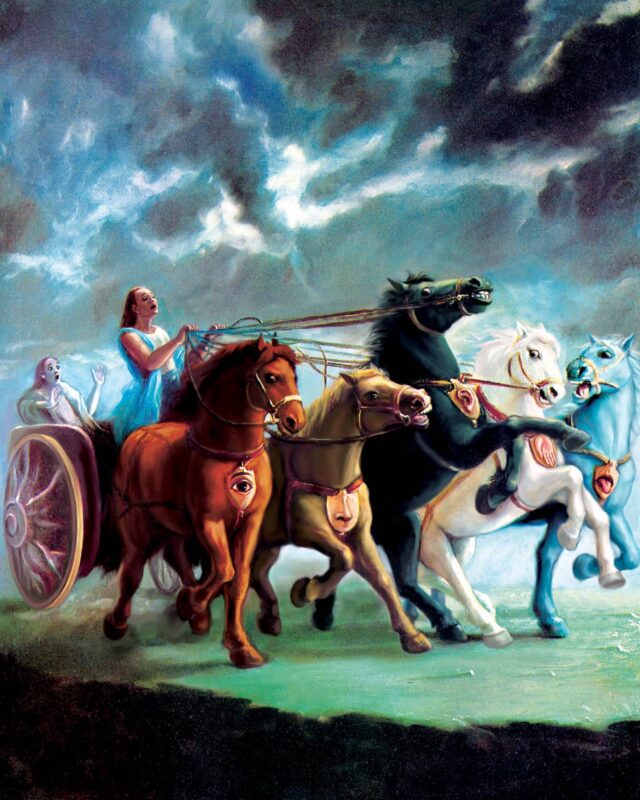
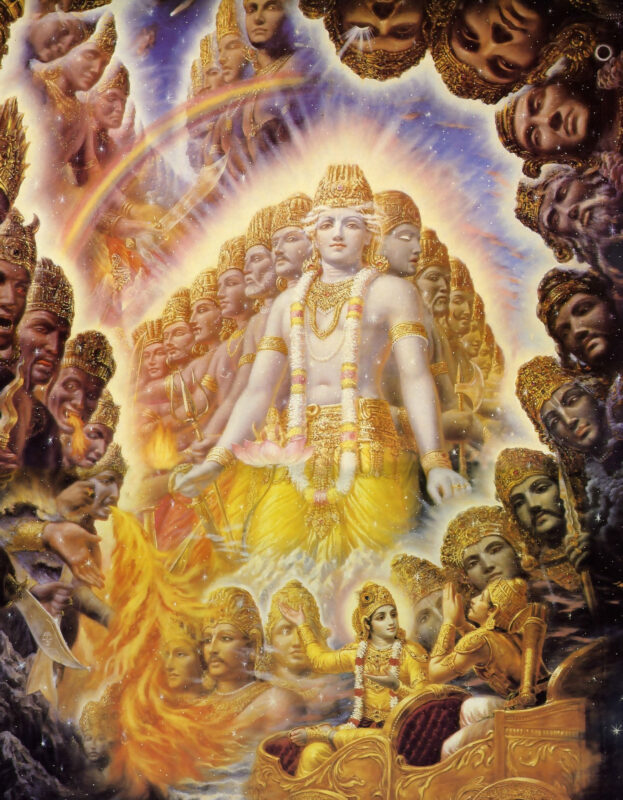
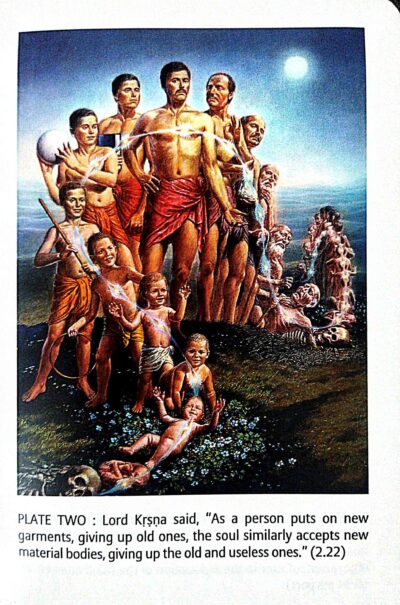
Chapters and Number of Shlokas
- Arjun Viṣhād Yog (47 verses): Lamenting the Consequences of War
- Sānkhya Yog (72 verses): The Yog of Analytical Knowledge
- Karm Yog (43 verses): The Yog of Action
- Gnana Karm Sanyās Yog (42 verses): The Yog of Knowledge and the Disciplines of Action
- Karm Sanyās Yog (29 verses): The Yog of Renunciation
- Dhyān Yog (47 verses): The Yog of Meditation
- Gnana Vignana Yog (30 verses): Yog through the Realization of Divine Knowledge
- Akṣhar Brahma Yog (28 verses): The Yog of the Eternal God
- Rāja Vidyā Yog (34 verses): Yog through the King of Sciences
- Vibhūti Yog (42 verses): Yog through Appreciating the Infinite Opulences of God
- Viśhwarūp Darśhan Yog (55 verses): Yog through Beholding the Cosmic Form of God
- Bhakti Yog (20 verses): The Yog of Devotion
- Kṣhetra Kshetrajna Vibhāg Yog (34 verses): Yog through Distinguishing the Field and the Knower of the Field
- Guṇa Traya Vibhāg Yog (27 verses): Yog through Understanding the Three Modes of Material Nature
- Puruṣhottam Yog (20 verses): The Yog of the Supreme Divine Personality
- Daivāsura Sampad Vibhāg Yog (24 verses): Yog through Discerning the Divine and Demoniac Natures
- Śhraddhā Traya Vibhāg Yog (28 verses): Yog through Discerning the Three Divisions of Faith
- Mokṣha Sanyās Yog (78 verses): Yog through the Perfection of Renunciation and Surrender
Repeating themes
- Be in a state of indifference at all times, not moved by and dualities, neither friends nor enemies.
- Control your senses, pull them back into the mind like a tortoise and it’s shell. Don’t let them control you.
- Do for the sake of doing without expectations of the win or the fruit.
- Know your duties from the 4 castes (Brahmins – priests and teachers, Kshatriyas – rulers and warriors, Vaishyas – merchants and cultivators, Shudras – servants) and perform them fully and for the welfare of all.
- Fix your mind, activities, achievements, etc. on Krishna and Krishna alone.
- Even though you interact and react on the material plane, the soul is untouched, live and act from that space.
- Material nature consists of three modes—goodness, passion and ignorance.
Duty and Action
2.47 – You have a right to perform your prescribed duty, but you are not entitled to the fruits of action. Never consider yourself the cause of the results of your activities, and never be attached to not doing your duty.
2.48 – Perform your duty equipoised, O Arjuna, abandoning all attachment to success or failure. Such equanimity is called yoga.
4.18 – One who sees inaction in action, and action in inaction, is intelligent among men, and he is in the transcendental position, although engaged in all sorts of activities.
5.2 – The Personality of Godhead replied: The renunciation of work and work in devotion are both good for liberation. But, of the two, work in devotional service is better than renunciation of work.
18.7 – Prescribed duties should never be renounced. If one gives up his prescribed duties because of illusion, such renunciation is said to be in the mode of ignorance.
Amazon #ads

18.47 – 18.49 – It is better to engage in one’s own occupation, even though one may perform it imperfectly, than to accept another’s occupation and perform it perfectly. Duties prescribed according to one’s nature are never affected by sinful reactions.
Every endeavor is covered by some fault, just as fire is covered by smoke. Therefore one should not give up the work born of his nature, O son of Kunti, even if such work is full of fault.
One who is self-controlled and unattached and who disregards all material enjoyments can obtain, by practice of renunciation, the highest perfect stage of freedom from reaction.
Senses and Mind
2.58 – One who is able to withdraw his senses from sense objects, as the tortoise draws its limbs within the shell, is firmly fixed in perfect consciousness.
2.60 – The senses are so strong and impetuous, O Arjuna, that they forcibly carry away the mind even of a man of discrimination who is endeavoring to control them.
2.62 – 2.63 – While contemplating the objects of the senses, a person develops attachment for them, and from such attachment lust develops, and from lust anger arises. From anger, complete delusion arises, and from delusion bewilderment of memory. When memory is bewildered, intelligence is lost, and when intelligence is lost one falls again into the material pool.
2.71 – A person who has given up all desires for sense gratification, who lives free from desires, who has given up all sense of pro prietorship and is devoid of false ego—he alone can attain real peace.
3.42 – The working senses are superior to dull matter; mind is higher than the senses; intelligence is still higher than the mind; and he [the soul] is even higher than the intelligence. (Soul > Intelligence > Mind > Senses > Dull matter.)
Amazon #ads

3.43 – Thus knowing oneself to be transcendental to the material senses, mind and intelligence, O mighty-armed Arjuna, one should steady the mind by deliberate spiritual intelligence [Krshna consciousness] and thus—by spiritual strength—conquer this insatiable enemy known as lust.
5.20 – A person who neither rejoices upon achieving something pleasant nor laments upon obtaining something unpleasant, who is self-intelligent, who is unbewildered, and who knows the science of God, is already situated in transcendence.
5.24 – One whose happiness is within, who is active and rejoices within, and whose aim is inward is actually the perfect mystic. He is liberated in the Supreme, and ultimately he attains the Supreme.
6.2 – What is called renunciation you should know to be the same as yoga, or linking oneself with the Supreme, O son of Pändu, for one can never become a yogi unless he renounces the desire for sense gratification.
6.6 – For him who has conquered the mind, the mind is the best of friends; but for one who has failed to do so, his mind will remain the greatest enemy.
14.22 – 14.25 – The Supreme Personality of Godhead said: O son of Pändu, he who does not hate illumination, attachment and delusion when they are present or long for them when they disappear; who is unwavering and undisturbed through all these reactions of the material qualities, remaining neutral and transcendental, knowing that the modes alone are active; who is situated in the self and regards alike happiness and distress; who looks upon a lump of earth, a stone and a piece of gold with an equal eye; who is equal toward the desirable and the undesirable; who is steady, situated equally well in praise and blame, honor and dishonor; who treats alike both friend and enemy; and who has renounced all material activities—such a person is said to have transcended the modes of nature.
18.51 – 18.53 – Being purified by his intelligence and controlling the mind with determination, giving up the objects of sense gratification, being freed from attachment and hatred, one who lives in a secluded place, who eats little, who controls his body, mind and power of speech, who is always in trance and who is detached, free from false ego, false strength, false pride, lust, anger, and acceptance of material things, free from false proprietorship, and peaceful—such a person is certainly elevated to the position of self-realization.
Technical and Instructions
3.3 – The Supreme Personality of Godhead said: O sinless Arjuna, I have already explained that there are two classes of men who try to realize the self. Some are inclined to understand it by empirical/practical, philosophical speculation and others by devotional service.
4.36 – 4.37 – Even if you are considered to be the most sinful of all sinners, when you are situated in the boat of transcendental knowledge you will be able to cross over the ocean of miseries. As a blazing fire turns firewood to ashes, O Arjuna, so does the fire of knowledge burn to ashes all reactions to material activities.
5.17 – When one’s intelligence, mind, faith and refuge are all fixed in the Supreme, then one becomes fully cleansed of misgivings through complete knowledge and thus proceeds straight on the path of liberation.
5.25 – Those who are beyond the dualities that arise from doubts, whose minds are engaged within, who are always busy working for the welfare of all living beings, and who are free from all sins achieve liberation in the Supreme.
5.27 – 5.28 – Shutting out all external sense objects, keeping the eyes and vision concentrated between the two eyebrows, suspending the inward and outward breaths within the nostrils, and thus controlling the mind, senses and intelligence, the transcendentalist aiming at liberation becomes free from desire, fear and anger. One who is always in this state is certainly liberated.
6.11 – 6.14 – To practice yoga, one should go to a secluded place and should lay kusha grass on the ground and then cover it with a deerskin and a soft cloth. The seat should be neither too high nor too low and should be situated in a sacred place.
The yogi should then sit on it very firmly and practice yoga to purify the heart by controlling his mind, senses and activities and fixing the mind on one point.
One should hold one’s body, neck and head erect in a straight line and stare steadily at the tip of the nose. Thus, with an unagitated, subdued mind, devoid of fear, completely free from sex life, one should meditate upon Me within the heart and make Me the ultimate goal of life.
6.16 – 6.17 – There is no possibility of one’s becoming a yogi, O Arjuna, if one eats too much or eats too little, sleeps too much or does not sleep enough. He who is regulated in his habits of eating, sleeping, recreation and work can mitigate all material pains by practicing the yoga system.
6.25 – Gradually, step by step, one should become situated in trance by means of intelligence thought, the mind should be fixed on the self alone and should think of nothing else.
7.4 – Earth, water, fire, air, ether, mind, intelligence and false ego—all together these eight constitute My separated material energies.
8.5 – 8.6 – And whoever, at the end of his life, quits his body, remembering Me alone, at once attains My nature. Of this there is no doubt. Whatever state of being one remembers when he quits his body, O son of Kunti, that state he will attain without fail.
8.10 – One who, at the time of death, fixes his life air between the eyebrows and, by the strength of yoga, with an undeviating mind, engages himself in remembering the Supreme Lord in full devotion, will certainly attain to the Supreme Personality of Godhead.
8.12 – 8.13 – The yogic situation is that of detachment from all sensual engagements. Closing all the doors of the senses and fixing the mind on the heart and the life air at the top of the head, one establishes himself in yoga. After being situated in this yoga practice and vibrating the sacred syllable om, the supreme combination of letters, if one thinks of the Supreme Personality of Godhead and quits his body, he will certainly reach the spiritual planets.
8.28 – A person who accepts the path of devotional service is not bereft of the results derived from studying the Vedas, performing austere sacrifices, giving charity or pursuing philosophical and fruitive activities. Simply by performing devotional service, he attains all these, and at the end he reaches the supreme eternal abode.
12.9 – 12.14 – My dear Arjuna, O winner of wealth, if you cannot fix your mind upon Me without deviation, then follow the regulative principles of bhakti-yoga. In this way develop a desire to attain Me.
If you cannot practice the regulations of bhakti-yoga, then just try to work for Me, because by working for Me you will come to the perfect stage.
If, however, you are unable to work in this consciousness of Me, then try to act giving up all results of your work and try to be self-situated. (Paras translation – complete in one’s self)
If you cannot take to this practice, then engage yourself in the cultivation of knowledge. Better than knowledge, however, is meditation, and better than meditation is renunciation of the fruits of action, for by such renunciation one can attain peace of mind.
One who is not envious but is a kind friend to all living entities, who does not think himself a proprietor and is free from false ego, who is equal in both happiness and distress, who is tolerant, always satisfied, self-controlled, and engaged in devotional service with determination, his mind and intelligence fixed on Me—such a devotee of Mine is very dear to Me.
13.6 – 13.7 – The five great elements –
1 False ego,
2 Intelligence,
3 Unmanifest primordial matter,
4 Eleven senses (five knowledge senses, five working senses, and mind),
5 Five objects of the senses
i) Desire and aversion,
ii) happiness and misery,
iii) the body,
iv) consciousness, and
v) the will
all these comprise the field and its modifications.
13.8 – 13.12 – Humility; pridelessness; nonviolence; tolerance; simplicity; approaching a bona fide spiritual master; cleanliness; steadiness; self-control; renunciation of the objects of sense gratification; absence of false ego; the perception of the evil of birth, death, old age and disease; detachment; freedom from entanglement with children, wife, home and the rest; even-mindedness amid pleasant and unpleasant events; constant and unalloyed devotion to Me; aspiring to live in a solitary place; detachment from the general mass of people; accepting the importance of self-realization; and philosophical search for the Absolute Truth—all these I declare to be knowledge, and besides this whatever there may be is ignorance.
13.23 – Yet in this body there is another, a transcendental enjoyer, who is the Lord, the supreme proprietor, who exists as the overseer and permitter, and who is known as the Supersoul.
13.25 – Some perceive the Supersoul within themselves through meditation, others through the cultivation of knowledge, and still others through working without fruitive desires.
13.27 – O chief of the Bhäratas, know that whatever you see in existence, both the moving and the nonmoving, is only a combination of the field of activities and the knower of the field.
13.29 – One who sees the Supersoul equally present everywhere, in every living being, does not degrade himself by his mind. Thus he approaches the transcendental destination.
Amazon #ads

13.30 – One who can see that all activities are performed by the body, which is created of material nature, and sees that the self does nothing, actually sees.
14.17 – From the mode of goodness – real knowledge develops;
from the mode of passion – greed develops;
and from the mode of ignorance develop foolishness, madness and illusion.
14.19 – When one properly sees that in all activities no other performer is at work than these modes of nature and he knows the Supreme Lord, who is transcendental to all these modes, he attains My spiritual nature.
16.21 – There are three gates leading to this hell—lust, anger and greed. Every sane man should give these up, for they lead to the degradation of the soul.
17.2 – The Supreme Personality of Godhead said: According to the modes of nature acquired by the embodied soul, one’s faith can be of three kinds—in goodness, in passion or in ignorance. Now hear about this.
17.4 – Men in the mode of goodness worship the demigods; those in the mode of passion worship the demons; and those in the mode of ignorance worship ghosts and spirits.
17.8 – 17.10 – Foods dear to those in the mode of goodness increase the duration of life, purify one’s existence and give strength, health, happiness and satisfaction. Such foods are juicy, fatty, wholesome, and pleasing to the heart.
Foods that are too bitter, too sour, salty, hot, pungent, dry and burning are dear to those in the mode of passion. Such foods cause distress, misery and disease.
Food prepared more than three hours before being eaten, food that is tasteless, decomposed and putrid, and food consisting of remnants and untouchable things is dear to those in the mode of darkness.
17.14 – 17.22 – When worship of the Supreme Lord, the Brahmins, the spiritual master, the wise, and the elders is done with the observance of cleanliness, simplicity, celibacy, and non-violence then this worship is declared as the austerity of the body.
Austerity of speech consists in speaking words that are truthful, pleasing, beneficial, and not agitating to others, and also in regularly reciting Vedic literature.
And satisfaction, simplicity, gravity, self-control and purification of one’s existence are the austerities of the mind.
This threefold austerity, performed with transcendental faith by men not expecting material benefits but engaged only for the sake of the Supreme, is called austerity in goodness.
Penance performed out of pride and for the sake of gaining respect, honor and worship is said to be in the mode of passion. It is neither stable nor permanent.
Austerity that is performed by those with confused notions, and which involves torturing the self or harming others, is described to be in the mode of ignorance.
Charity given out of duty, without expectation of return, at the proper time and place, and to a worthy person is considered to be in the mode of goodness.
But charity performed with the expectation of some return, or with a desire for fruitive results, or in a grudging mood, is said to be charity in the mode of passion.
And charity performed at an impure place, at an improper time, to unworthy persons, or without proper attention and respect is said to be in the mode of ignorance.
18.5 – Acts of sacrifice, charity and penance are not to be given up; they must be performed. Indeed, sacrifice, charity and penance purify even the great souls.
18.13 – 18.15 – O mighty-armed Arjuna, according to the Vedänta there are five causes for the accomplishment of all action. Now learn of these from Me.
1 The place of action [the body],
2 The performer,
3 The various senses,
4 The many different kinds of endeavor, and
5 Ultimately the Supersoul
these are the five factors of action.
Whatever right or wrong action a man performs by body, mind or speech is caused by these five factors.
18.18 – 18.21 – Knowledge, the object of knowledge, and the knower are the three factors that motivate action; the senses, the work and the doer are the three constituents of action.
According to the three different modes of material nature, there are three kinds of knowledge, action and performer of action. Now hear of them from Me.
That knowledge by which one undivided spiritual nature is seen in all living entities, though they are divided into innumerable forms, you should understand to be in the mode of goodness.
That knowledge by which one sees that in every different body there is a different type of living entity you should understand to be in the mode of passion.
18.23 – 18.24 – That action which is regulated and which is performed without attachment, without love or hatred, and without desire for fruitive results is said to be in the mode of goodness.
But action performed with great effort by one seeking to gratify his desires, and enacted from a sense of false ego, is called action in the mode of passion.
18.26 – The performer is said to be in the mode of goodness, when he or she is free from egotism and attachment, endowed with enthusiasm and determination, and equipoised in success and failure.
Lots of examples on modes of ignorance, darkness, passion and goodness.
18.37 – That which in the beginning may be just like poison but at the end is just like nectar and which awakens one to self-realization is said to be happiness in the mode of goodness.
18.42 – 18.44 – Peacefulness, self-control, austerity, purity, tolerance, honesty, knowledge, wisdom and religiousness—these are the natural qualities by which the brähmanas work.
Heroism, power, determination, resourcefulness, courage in battle, generosity and leadership are the natural qualities of work for the kshatriyas.
Farming, cow protection and business are the natural work for the vaishyas, and for the shüdras there is labor and service to others.
A summary from ChatGPT
The Bhagavad Gita, often referred to as the Gita, is a 700-verse Hindu scripture that is part of the ancient Indian epic, the Mahabharata. It consists of a conversation between Prince Arjuna and Lord Krishna, who serves as his charioteer and spiritual guide. The Gita covers a wide range of philosophical and spiritual topics, but some of the repeating themes include:
1. Duty and Righteousness: The Gita emphasizes the importance of fulfilling one’s duty (dharma) with dedication and integrity. It encourages individuals to perform their responsibilities without attachment to the outcome, understanding that their duty is a reflection of their larger purpose in life.
2. Selfless Action: The Gita teaches the concept of selfless action, where individuals are encouraged to engage in their duties without seeking personal gain or being driven by ego. It stresses the idea of acting for the benefit of others and the greater good rather than being motivated by selfish desires.
3. Yoga and Meditation: The Gita discusses different paths of yoga, including karma yoga (the path of selfless action), bhakti yoga (the path of devotion), and jnana yoga (the path of knowledge and wisdom). It highlights the significance of meditation and self-discipline as means to attain self-realization and union with the divine.
Amazon #ads

4. Transience and Immortality: The Gita explores the transient nature of the physical world and the eternal nature of the soul (atman). It teaches that the soul is indestructible, and death is merely a transition. Understanding the impermanence of the material world helps individuals detach from material possessions and focus on spiritual growth.
5. The Nature of Reality: The Gita delves into the concept of the ultimate reality, often referred to as Brahman or the Supreme Self. It discusses the interconnectedness of all beings, the illusion of separateness, and the underlying unity of existence.
6. Renunciation and Renunciation-in-Action: The Gita addresses the idea of renunciation, emphasizing that true renunciation is not about giving up external responsibilities but rather cultivating a state of detachment and inner equanimity while fulfilling one’s duties in the world.
These are some of the recurring themes in the Bhagavad Gita. The text is highly regarded for its profound philosophical insights, ethical teachings, and guidance on leading a purposeful and meaningful life.


